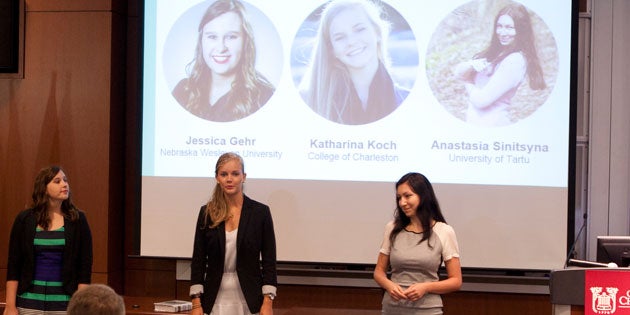Lightning never strikes twice in the same place, or so the saying goes. But for the second time in two months, student entrepreneurs at the College of Charleston have been rewarded for developing unique, viable products. And once again, what was expected to be a modest cash prize, significantly increased in size at the last minute.

NGAL students from the College pose with their peers from the University of Tartu and Nebraska Wesleyan University in Tartu, Estonia last March.
Recently, six teams of students representing three universities (the College, the University of Tartu in Estonia and Nebraska Wesleyan University) went head-to-head in a pitch contest as the culmination of the NGAL Program. (NGAL stands for Network Globally, Act Locally.)
The student pitches, which featured products as diverse as an app that links individuals interested in social change (ServLink) to an app and platform that facilitate the sharing and resale of college text books (A Borrowed Book), were just three minutes in length. And an esteemed panel of judges – including Kevin Burns, the COO of Chobani Yogurt and Hugh Lane, Chairman of the Board of the Bank of South Carolina – had four minutes to ask questions.
When the results were tallied, the winner was Sparky.com, an app whose creators describe it as “Tinder for dogs.” Sparky enables dog owners to connect with one another in order to set up play dates for their pets. Team Sparky won $3,000 though the anticipated prize at the beginning of the pitch event was $1,000. While the judges were conferring, Harry Huge of the Harry and Reba Huge Foundation (a principal supporter of NGAL) quietly donated an additional $7,000 so that winning team could take home $3,000 and each of the other five teams would take home $1,000.
Team Sparky included a computer science major from the College of Charleston, a master’s candidate in economics from the University of Tartu and a biochemistry and molecular biology major from Nebraska Wesleyan University.
Though the NGAL students had collaborated virtually for 12 weeks, Team Sparky changed its focus for the product just four days before the contest. “That’s exactly what we teach in this program,” said Chris Starr ’83, an information management professor from the College and a co-director of NGAL. “These students learn to move on quickly from concepts that aren’t viable.” According to Starr, NGAL is a unique in the realm of entrepreneurial programs because it links students internationally across geography and time zones and unites diverse academic disciplines.




